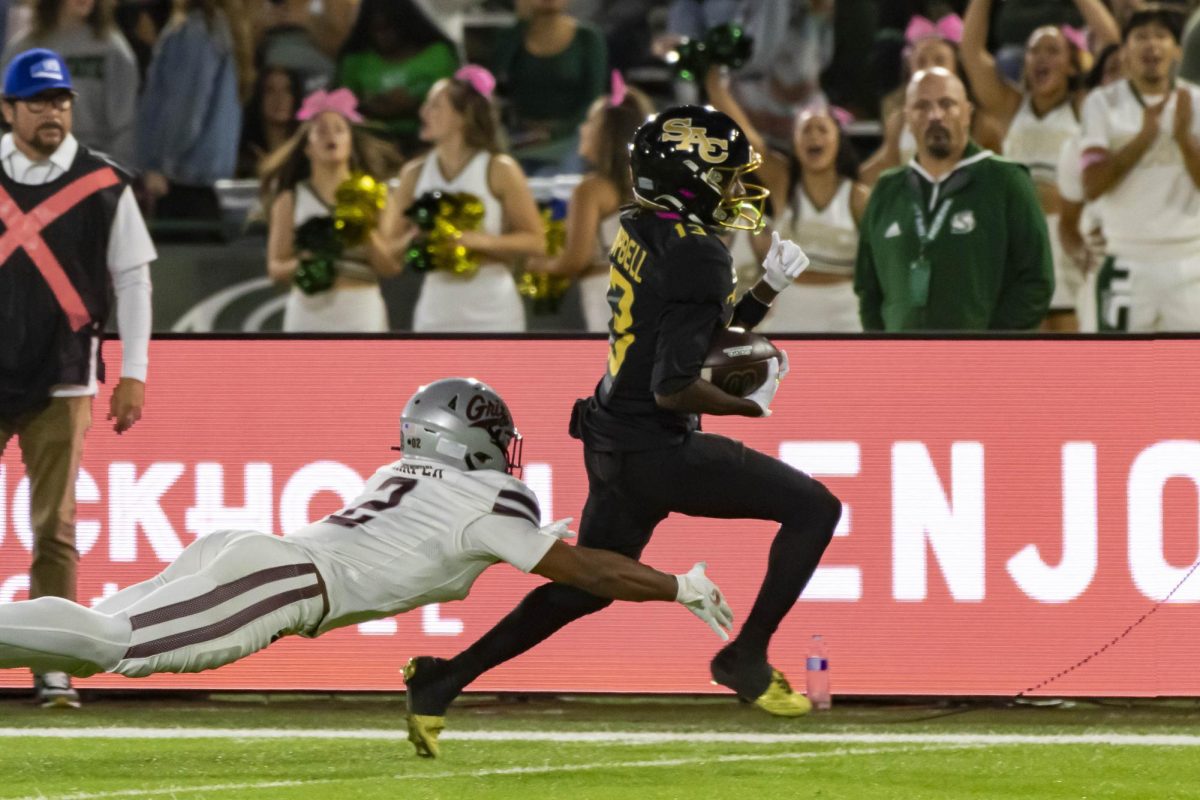Family Matters
October 6, 2004
Sacramento State head football coach Steve Mooshagian exited through the locker room door and paused, both in speech and movement.
He gazed with wonderment through the trees, lawns and buildings at the surrounding campus and smiled, as if seeing it for the first time.
“People just don’t know; they just can’t see the potential here,” Mooshagian said. “It will be a lot of fun.”
The 45-year-old coach with a prove-’em wrong attitude knows he is the right man for the job; that confidence is all part of his charm. But Mooshagian, or “Moose,” knows that the process is still in its earliest steps and a turnaround isn’t going to happen instantaneously.
For the program to ever meet its potential, the process needs to start in the locker room.
If Sac State football were a boat, Mooshagian would still be steering within the no-wake zone, far away from the ability to push full throttle.
That doesn’t mean he is idling though.
Despite an inauspicious 2-9 record in his first year, and a 1-3 start this season, Mooshagian is positive things will turn around. With every game, practice and team meeting, the second-year coach is taking stronger control of the program.
Considering the difference in coaching philosophies between Mooshagian and former head coach John Volek, It’s no surprise that it has already taken more than a year to fit in with the program.
“Volek was a very good people person and brought the community to Sac State,” senior defensive back Ramon Payne said. “Mooshagian is focused more on the actual team, and wants ‘winning first’ to bring everyone in.”
Both Mooshagian and Athletic Director Terry Wanless give a lot of credit to Volek for establishing the program, saying that they would be much further behind without the job he did.
At the time of Volek’s departure though, there was a major question about the control and conduct of the program. In Volek’s final season, the team was caught in a number of controversies including the infamous PAM scandal, the suspension of six players for marijuana use, and Volek’s own one-game suspension for questioning officiating.
“There is a lot more discipline now,” senior wide receiver Fred Amey said. “In the past, players didn’t have as much respect for the coach. Guys would treat him like a substitute teacher and they would try and run over him.
“Now everyone has respect for all the coaches.”
However, the adjustment wasn’t easy for anyone.
“When you first look at (Mooshagian), he looks mean,” Amey said. “But you get to know him and realize he is a real easy-going person, someone you can talk to whenever.”
Mooshagian admits that there were a lot more challenges jumping back to college from his job with the Cincinnati Bengals than he initially perceived. The cut and dry approach that worked with pro athletes was far different than the responsibilities of coaching college student-athletes.
When Mooshagian was with Bengals he got a glimpse of Bengals receiver Peter Warrick’s paycheck, spotting an enormous $900,000 figure — an amount taken out in taxes alone.
“I could only affect a guy’s life so much when he is making that kind of money,” Mooshagian said.
“Being in pro football for all those years, I forgot what (college) was like and I had to learn it again,” Mooshagian said. “For a lot of guys it was difficult early on.”
Mooshagian’s initial perception of last year’s team changed throughout the season. He said that individual meetings with players allowed him to see his players and their emotions, to see them as more than just football players.
“I made a lot of mistakes and I don’t mind taking a lot of blame for the lack of success we had last season,” Mooshagian said.
“I really credit a lot of these kids for teaching me what I am here for.”
Mooshagian still gets phone calls from players he used to coach, either still playing or settling into families and jobs. “Hearing how you helped these guys in life is one of the biggest rewards in being a coach,” he said.
He feels that college football is an excellent way to ready someone for handling the rest of his life.
Bengals receiver T.J. Houshmandzadeh continues to talk often with his former wide receiver coach. During Houshmandzadeh’s NFL rookie season in 2001, Mooshagian invited eight of the team’s wide receivers to his house for dinner with his family.
“We just hung out there and relaxed,” Houshmandzadeh said. “He just wanted everyone to feel comfortable.
“It means a lot when a man invites you to his home to meet his children and has his wife cook for you. It is something that I haven’t done here since he left.”
Mooshagian is now creating that same welcoming atmosphere within the Sac State locker room. He has moved in used couches, places for students to study and his old big screen television for players to play video games on.
He runs it like his house too.
“He is a clean freak and that locker room is like his own house,” senior quarterback Ryan Leadingham said. “This is the cleanest I have ever seen the locker room. He makes us run if it’s not clean.”
Leadingham says other NFL mentalities have followed Mooshagian.
“He is always saying, ‘If you’re late, I’m going to fine you. If your cell phone is on, I’m going to fine you,'” Leadingham said. “You can’t fine us, you’re not in the NFL anymore.
“It always NFL this, NFL that. ‘With the Bengals we did this.’ And everybody looks at him like, ‘Dude, the Bengals sucked!'”
It’s all said in the context of a fun, relaxed relationship between the head coach and starting quarterback, of course.
All players agree that the joking stops on the football field though. Mooshagian brings the right balance of both discipline and fun.
“Practices are very intense. There is no time for goofing off,” Payne said. “Everything this team does is demanding. We can do it and have fun, but he also wants things to get done.”
Mooshagian used to be the mean-looking stranger, but now he is the head of a large family.
“He’s been able to be the fun guy or the mean guy, but it helps that he has been smooth. There is no change in him unless there is a change in us.”



























































































































